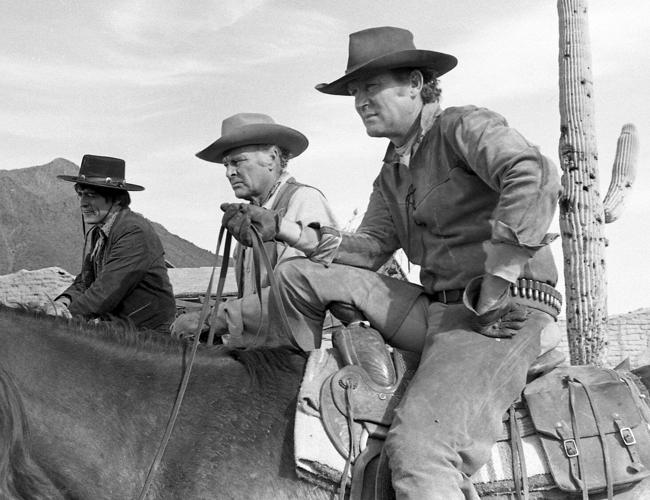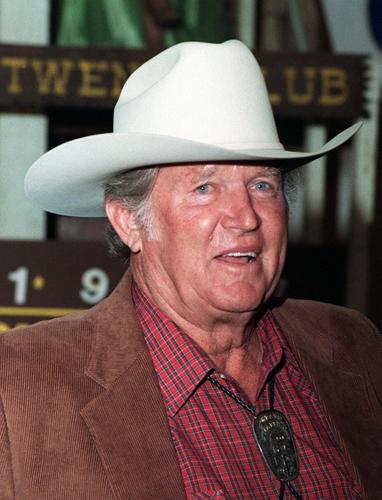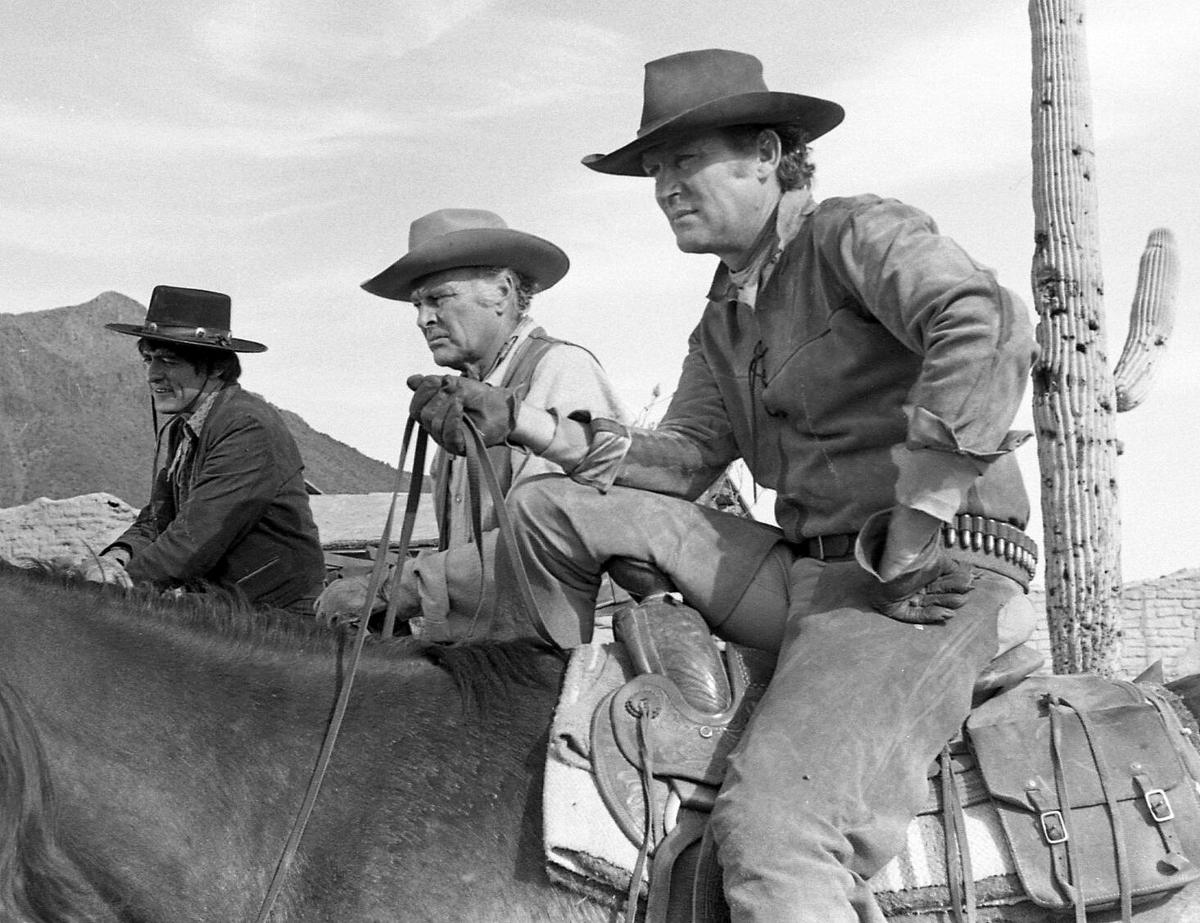He shared the silver screen with legends like John Wayne, Kirk Douglas, Dean Martin and Elvis Presely, but Tucson transplant Don Collier never took himself too seriously.
When a fan would ask him if he was the man who played Sam Butler in the popular late-1960s TV series “The High Chaparral,” his gravel-throated response was usually something like: “Yeah, I’m what’s left of him.”
The longtime show-business cowboy and pitchman died in Kentucky from lung cancer on Sept. 13. He was 92.
Collier was born in Inglewood, California, on Oct. 17, 1928.
After stints with the U.S. Navy and the merchant marine, he went to Hardin-Simmons College in Texas and then to Brigham Young University in Utah.
He broke into show business as an extra in 1948. What followed was a 70-year acting career, mostly in Westerns, though he did get tossed onto a dessert cart by Elvis in “Paradise, Hawaiian Style.”
In 1959, Collier’s horse-riding skills landed him a starring role as Marshal Will Foreman on the series “Outlaws.” The following year, he notched his first real movie credits, including a small part in Audie Murphy’s “Seven Ways from Sundown.”
According to the entertainment website IMDb, Collier eventually racked up more than 200 film and television credits, including parts in three John Wayne pictures: the Tucson-filmed “El Dorado” in 1966, “The War Wagon” in 1967 and “The Undefeated” in 1969.
The rugged, blue-eyed cowboy straight from central casting also showed up in virtually every major TV series set in the Old West, including “Bonanza,” “The Virginian,” “Wagon Train,” “Gunsmoke,” “Branded,” “Death Valley Days” and “Little House on the Prairie.”
But arguably his best-known character was the honorable ranch foreman in “The High Chaparral,” which was filmed on location at Old Tucson Studios from 1966 to 1971.
Later generations came to know Collier from another part he enjoyed playing almost as much. In the early 1980s, he squinted under his cowboy hat and blew bright pink bubbles as the “gum-fighter” in a series of commercials, also shot at Old Tucson, for Hubba Bubba chewing gum.
That’s about the time Collier made Tucson his home in real life, too.
He would later lend his trademark voice and sideburns to other national ad campaigns, spots for local businesses and TV stations and to the University of Arizona-produced PBS show “The Desert Speaks,” for which he served as on-air host for more than decade.
His eventual replacement on that show, David Yetman, said he knew Collier would be “a very, very tough act to follow.”

Don Collier was the Grand Marshal of the 1997 Tucson Rodeo Parade.
“He had a delightful personality, laced with humor and unending anecdotes,” Yetman said in an email. “I was most impressed by his acting ability. The folks at KUAT would provide him with a script. He would look at it for a few moments, then cite it from memory, adding his own touch as though seasoning a soup.”
Arbuckle Coffee Roasters in Tucson recruited Collier as its celebrity spokesman in 2007, but he soon became a family friend, said Josh Willis, who helps run the long-standing local business with his parents, Pat and Denney.
If you call Arbuckle and get put on hold, that’s Collier you will hear talking about the coffee brand’s origin story.
Willis said Collier loved living in Tucson because of the desert landscape, the people and all the great memories he made here. The big-screen cowboy seemed genuinely thrilled in 1997 when he was selected to be grand marshal of the Tucson Rodeo Parade.
Despite his long list of acting credits, Collier carried no trace of a “big Hollywood ego,” Willis said.
“He never acted entitled,” he said. “He was super considerate and approachable to fans. People loved him for that.”
Even into his 80s and 90s, Collier kept landing TV and movie roles and making public appearances at Western conventions and nostalgia shows, often driving himself to the events.
“He was always looking forward to something new,” Willis said.
Collier moved to Kentucky in 2020 to be close to relatives.
Willis went to see him there about two weeks before he died. He said they swapped funny stories and watched a few old clips from Collier’s long career, including a screen test for a part he didn’t get in a 1960 sitcom that’s now kept — inexplicably without a soundtrack — in the Library of Congress.
“He really knew how to make people happy,” Willis said. “He was a true friend.”
Collier was preceded in death by his wife, Holly; and two sons, Donald Mounger Jr. and David Tugwell.
He is survived by two sons, Steven (Susan) Mounger and Mike Mounger; two daughters, Pamela (Joe) Roan and Diane Swearengin; 11 grandchildren; 19 great-grandchildren and two great-great-grandchildren.
A celebration of Collier’s life was held Sunday in Willisburg, Kentucky.
His family suggests that donations be made to the American Cancer Society and St. Jude’s Children’s Hospital.
Photos: Moviemaking at Old Tucson Studios

Visitors at Old Tucson often have a chance to watch actual movie or television filming. Shown in the foreground, they watch actor Cameron Mitchell at work in July 1977. John Wayne, Paul Newman, Glenn Ford, Clint Eastwood and Kirk Douglas are among the stars that have filmed there.

James Coburn during production of "The Last Hard Man" at Old Tucson on November 6, 1975.

Lee Marvin, right, talks with Jack Palance during a break in the filming of "Monte Walsh" at Old Tucson in 1970. For this film the production company built the town of Harmony 35 miles east of Tucson. The set there is now the Mescal location and still used today.

Old Tucson Studios in 1980.

Night scenes for the John Wayne classic, "Rio Bravo" at Old Tucson on May 24 1958.

Building the soundstage at Old Tucson on June 11, 1968.

The cast of the televsion show "High Chaparral" on set at Old Tucson in May, 1968. From left, Henry Darrow, Leif Erickson and Don Collier, who lived in Tucson and showed up in local TV commercials later in life.

Glenn Ford at Old Tucson on October 1966 during production of "Pistolero" Upper Sabino Canyon was also used for filming. The classic Western actor also appeared as the bad guy in the original "3:10 to Yuma," also filmed at Old Tucson.

Dean Martin hangs on to Ricky Nelson as John Wayne takes a swing with a blanket on the set of Rio Bravo at Old Tucson Studios in 1959.

Actor Max von Sydow gets makeup on the set of "Reward" on June 15, 1964. A section of the Old Tucson in Tucson Mountain Park was remodeled to depict a street in a small Mexican town. Two of the movie's scenes were filmed at Old Tucson.

Actor John Saxon, left, and director John Huston during production of "The Life and Times of Judge Roy Bean" at Old Tucson in December, 1971. The film starred Paul Newman.

An Andy Warhol Western? Yep. It was "Lonesome Cowboys" and it was filmed at Old Tucson in 1968.

The streets of Old Tucson transformed for the movie "McLintock!" starring John Wayne and Maureen O'Hara in December, 1962.

A film camera truck pulls a stagecoach on the set of "The Lone Ranger" near Old Tucson in 1957.

Sidney Poitier with Lilia Skala on the set of "Lilies of the Field" Movie in December 1962. Poitier was the first African American actor to win the Oscar for Best Actor for his portrayal of Homer Smith in the movie.

On the set of "Gunfight at the O.K. Corral" in 1957. It starred Burt Lancaster and Kirk Douglas and was directed by John Sturges, who directed several other movies at Old Tucson.

Actor Paul Newman has his photo taken by his wife Joanne Woodward during a break in filming of "Hombre" at Old Tucson in 1967. Woodward said, "Being married to Paul is being married to the most considerate, romantic man." Newman died in 2008.

Director John Sturges, left, confers with actor Clint Eastwood during production of "Joe Kidd" at Old Tucson on December 2, 1971. Sturges was a well-known action film director with such hits as "The Great Escape" and "The Eagle Has Landed."

Noah Beery Jr. at Old Tucson on June 5, 1968. He played James Garner's father in the TV series, "Rockford Files."

Walter Brennan snd John Wayne during filming of Rio Bravo in 1958. These ruins are leftover walls from the Mexican Village built for the film "Arizona." John Wayne filmed four movies at Old Tucson.

A building is expanded during set improvements for the movie "El Dorado" starring John Wayne and Robert Mitchum at Old Tucson on September 28, 1965.

The church is changed using adobe bricks during set improvements for the movie "El Dorado" starring John Wayne and Robert Mitchum at Old Tucson on September 28, 1965.

Robert Shelton (left) then president of Old Tucson talks with art director George Chan (right) from 20th Century Fox during building construction in 1964.

A scene from the 1940 film "Arizona" for which Old Tucson was built. The look and feel of the town was more authentic than any Western filmed to that point..

James Arness rides through Old Tucson as Sheriff Matt Dillon in TVs Gunsmoke. Gunsmoke ran from 1955-1975, though most episodes were filmed in Southern California.

Kirk Douglas shows other actors how to draw and whirl during the filming of "Posse" at Old Tucson in October, 1974. Douglas was the star and director of the film.

Actor Josh Brolin, who played Jimmy Hickok in the television show "The Young Riders" on the set at Old Tucson Studios in August, 1989. Brolin is an accomplished actor, with credits like "No Country for Old Men."

Moses Gunn (left) and Merlin Olsen (right), rehearse a scene from one of the many episodes of "Father Murphy" filmed at Old Tucson from 1981-83. Olsen was a Pro Hall of Fame tackle for the Los Angeles Rams.

Actress Michelle Carey (best known for her role in "El Dorado" with John Wayne) on the set of "Scandalous John" at Old Tucson in November, 1970. Carey spent most of her career in supporting TV roles, including three appearances in "The Wild Wild West."

John Wayne, on the set of "Rio Lobo" in Old Tucson in June, 1970, confessed to Tucson Citizen movie critic Micheline Keating that he was nervous about the Academy Awards show the next night. He won Best Actor for "True Grit." Rio Lobo was his last film at Old Tucson.

An extra catching a snooze in the warm sun on the set of "McLintock!" at Old Tucson in 1962.

Writer-director Burt Kennedy, right, on the set of "Young Billy Young," aka "Who Rides with Kane" at Old Tucson in July, 1968. Actor John Anderson is at left. Kennedy, a decorated WWII veteran, also directed "The War Wagon," "Support Your Local Gunfighter," and episodes for several TV show.






